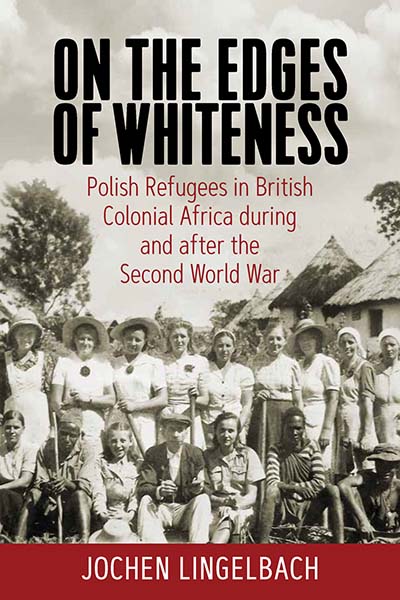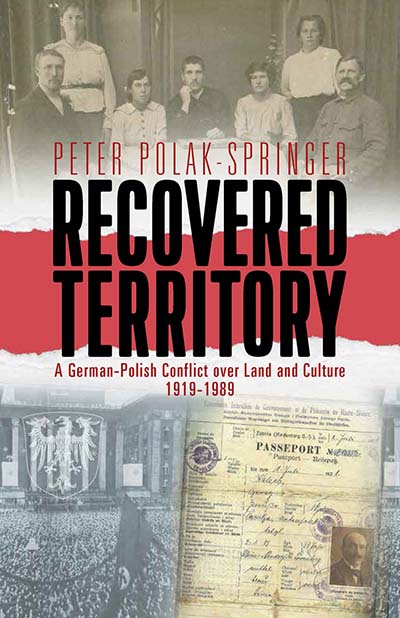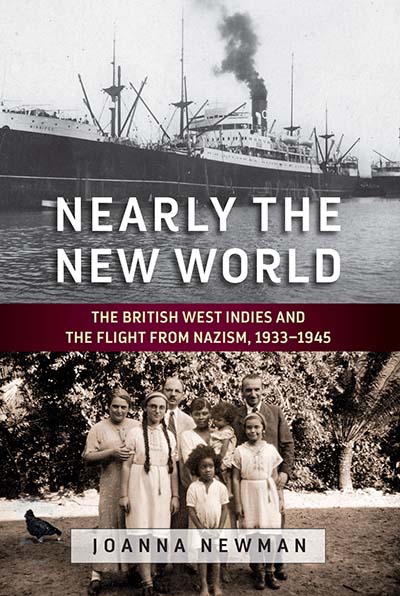
See Related
History JournalsEmail Newsletters
Sign up for our email newsletters to get customized updates on new Berghahn publications.
On the Edges of Whiteness
Polish Refugees in British Colonial Africa during and after the Second World War
Jochen Lingelbach
306 pages, 15 illus., bibliog., index
ISBN 978-1-78920-444-5 $135.00/£104.00 / Hb / Published (May 2020)
ISBN 978-1-80073-912-3 $34.95/£27.95 / Pb / Published (May 2023)
eISBN 978-1-78920-447-6 eBook
Reviews
“Overall, Lingelbach’s work has provided a much needed spotlight onto the complex and ambivalent position of a ‘subaltern white’ and is careful to frequently reiterate to the reader that the Polish refugees were by no means a homogenous group. Taken together, the distinctions of gender, class, ethnicity and religion have made this case study an important insight into a time when British colonial rule was on the brink of collapse… This is an excellently researched book which employs the use of original oral histories, extensive archival work, and some of the most thorough footnoting ever witnessed.” • European History Quarterly
“Lingelbach takes the reader through this unusual story, skilfully blending ‘global history’ approaches, refugee-, postcolonial- and subaltern studies with gender perspectives and national (Polish) history. Given his background in African studies, the author brings a fresh perspective, approaching each of these disciplines, particularly the historiography of Poland, in an admirably novel way… A fascinating study… shows that going beyond Eurocentrism can produce truly inspiring historiographical outcomes.” • War in History
“Jochen Lingelbach is to be applauded for his elegant handling of a complex narrative, switching between British colonies without losing the reader; the author writes in clear prose, masterfully leads his readers through each chapter, and brings home his points powerfully in the conclusion. This enlightening study is enriched with helpful maps, drawings and photographs depicting life in the refugee settlements.” • Revue d'Histoire Contemporaine de l'Afrique
“Lingelbach deserves high praises for this clever book that sets the tone for further inquiries into the place of Polish and other “subaltern whites” in colonial settings. His erudition is commendable, as is his ability to connect social and intellectual issues to broader colonial geopolitics, including the demystification of whiteness and independence of colonies in Africa after World War II…This will be an important book for years to come.” • H-Poland
“Taken together, the chapters offer persuasive insights into the ambivalent position of Polish refugees in their hosting countries and their complex interactions with the different actors of colonial societies. Lingelbach convincingly argues that they were similar to many subaltern groups such as the poor, criminals, and lunatics. They were, therefore, ‘located on the edges of whiteness’…Certainly, the book significantly contributes to refugee history, whiteness studies, and the history of colonial Africa during and after the Second World War.” • Journal of Contemporary History
“Lingelbach places the Polish settlers at the centre of a complicated web of relations in terms of race, gender and class, as well as processes such as the Second World War, Poland’s post-war status as a Soviet satellite, decolonisation, the new, post-war global refugee regime, etc. The story he tells is thus complex, novel and interesting.” • H-Soz-Kult
“This is a solid piece of research that addresses a rarely explored aspect of the global refugee crisis of the World War II era. In drawing comparisons between the Poles' experiences in different countries and regions, it gives voice to the African perspective and provides a much-needed contextualization of the refugees' reception.” • Lynne Taylor, University of Waterloo
“This fascinating book adds considerably to the literature on refugee history and whiteness studies. Tracing the experience of Polish refugees across multiple colonies, Jochen Lingelbach demonstrates the necessity of closely attending to the peculiarities of the context in which any group of refugees seeks shelter.” • Brett Shadle, Virginia Tech
Description
From 1942 to 1950, nearly twenty thousand Poles found refuge from the horrors of war-torn Europe in camps within Britain’s African colonies, including Uganda, Tanganyika, Kenya and Northern and Southern Rhodesia. On the Edges of Whiteness tells their improbable story, tracing the manifold, complex relationships that developed among refugees, their British administrators, and their African neighbors. While intervening in key historical debates across academic disciplines, this book also gives an accessible and memorable account of survival and dramatic cultural dislocation against the backdrop of global conflict.
Jochen Lingelbach is a postdoctoral research fellow in African History at the University of Bayreuth. He obtained his doctorate at the University of Leipzig and currently works on the project “Africa in the Global History of Refugee Camps” within the University of Bayreuth’s “Africa Multiple” Cluster of Excellence.
Subject: History: World War IIRefugee and Migration StudiesColonial History
Area: Africa
Contents
Download ToC (PDF)




